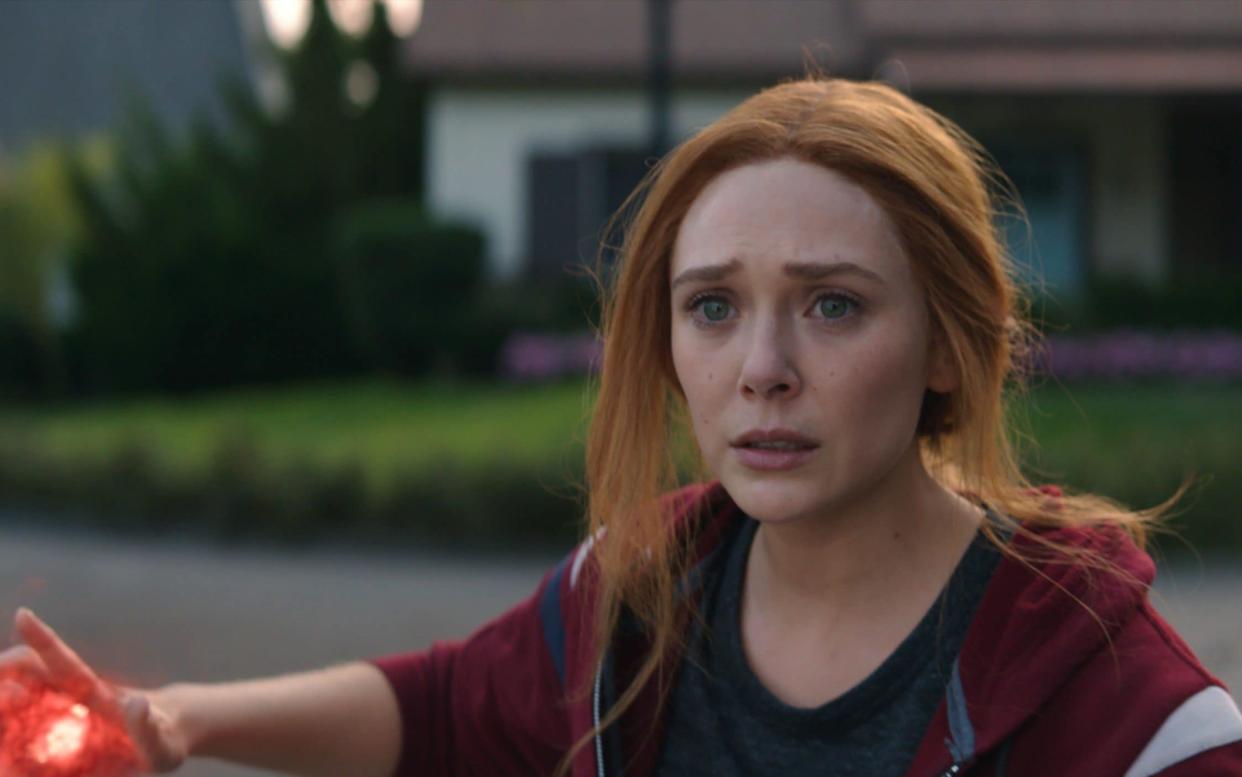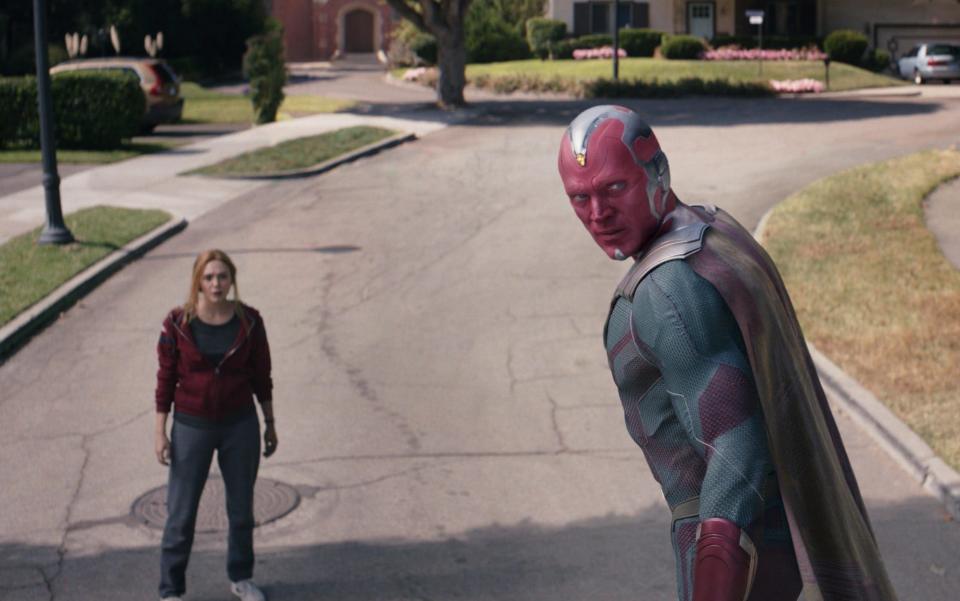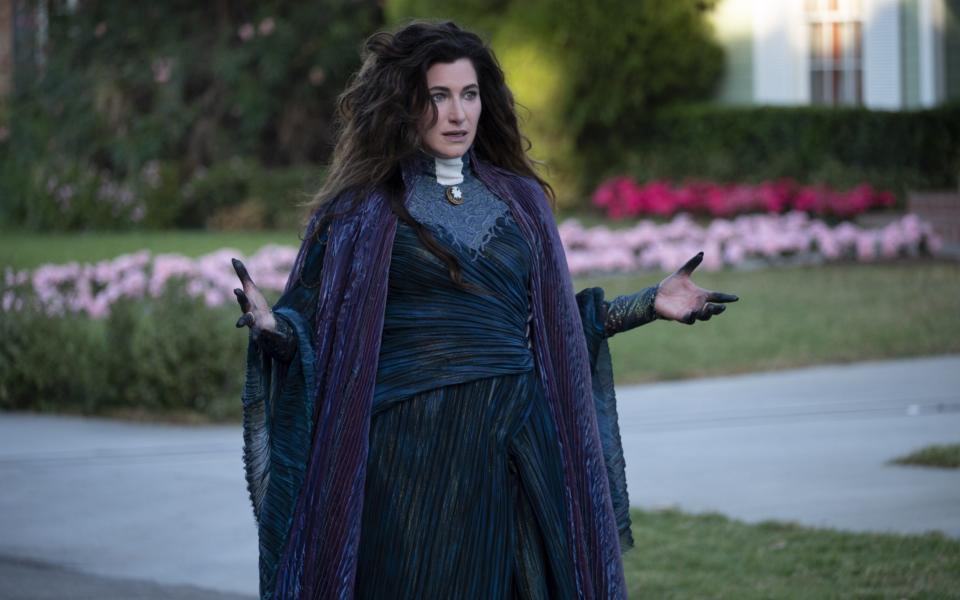WandaVision, episode 9, review: a wham-bam finale with an emotional twist

- Oops!Something went wrong.Please try again later.
- Oops!Something went wrong.Please try again later.
Tears, explosions and Blade Runner references were all crammed into the finale of WandaVision (Disney+) – Marvel’s most ambitious attempt yet at transposing its cinematic universe to the small screen. All that was missing was a stunning final twist. Rumours that Al Pacino might turn up playing Mephisto, aka the Marvel equivalent of Satan, proved to be merely Reddit dream logic.
Nor was there a cameo from Benedict Cumberbatch’s Doctor Strange (Sherlock with uncanny powers and an even uncannier American accent). Or from Dick Van Dyke, the spiritual inspiration for the series’s retro early episodes.
Such speculation had been partly fuelled by Paul Bettany’s tease that the final dispatch would see his Vision character face off against a “special guest star”. This turned out to be merely a reference to the reincarnated “White Vision” , also played by Bettany and conjured by the SWORD government agency to eliminate the original Vision. Or rather, eliminate the fabricated Vision spun out of the grief and yearning of his partner, Wanda (Elizabeth Olsen). And if that doesn’t make sense, then rest assured nothing else about the episode will either.
The WandaVision finale was essentially the point at which it completed its transformation from quirky puzzle box to standard Marvel monster truck. In its initial instalments WandaVision had leaned into the delicious conceit of layering a mystery inside a hall of mirrors of pastiches of classic American sitcoms. Week one had riffed on the idea of a perfect Fifties American suburb and comedies such as the Dick Van Dyke Show and I Love Lucy.
And from there it had rushed through the decades. There were winks at Bewitched, The Partridge Family, Family Ties, Arrested Development, Malcolm in the Middle, Modern Family etc.
This was all fun. But Marvel and Disney didn’t get where they are today – ruling over popular entertainment like Thanos floating around on his magic chair – by pushing the envelope too far. And so the finale stripped away all most of the truly weird stuff and devoted a chunk of its run time to a wham-bam fight between Wanda’s Scarlet Witch and her nemesis, Agatha Harkness (Kathryn Hahn). It seemed to be what the public wanted, with reports of Disney+ crashing when the episode went live at 8am in the UK.

Likewise flying about punching and flinging energy beams were Vision and White Vision. The former had been summoned wholesale from Wanda’s grief, the latter was a killbot stitched together from the wreckage of the original Vision. They tangled until Vision bested White Vision with an exercise in logic in which he suggested that neither was the original Vision, merely refractions of him. And so White Vision’s mission to “destroy Vision” could not be completed. They might as well team up.
Yet if WandaVision featured lots of what we have come to expect from Marvel films – the image of Wanda “levelling up” to the Scarlet Witch by absorbing streams of energy was so cliched as to verge on parody – there was an emotion-shredding conclusion.
Wanda had carved out the “Hex” to wall herself off from the reality of Vision’s death (in Avengers: Infinity War). Having invaded the minds of her neighbours in Westview, New Jersey, she’d created an alternative future where she, Vision and their two sons lived in suburban bliss.
But it was an illusion, as she accepted at the end when allowing the Hex to collapse and take imaginary Vision and the boys with it. We’d already been tipped off with Westview’s cinema having briefly advertised The Tannhäuser Gate. That was a quote from the Rutger Hauer/Roy Batty “Tears in the Rain” speech from Blade Runner, in which a machine – not so different from Vision, perhaps – reckons with its imminent demise.

You’d have to be a reanimated killer robot not to find it all hugely moving. Much has been written about how WandaVision is a metaphor for grieving and moving on. And the scene where Vision and Wanda hugged, their boys upstairs in bed, as the walls of reality came crashing back in landed like a gut-punch.
This was a reminder that, though fully merged with the Disney hivemind, Marvel continues to possess a soul. Show me a Batman or Superman film from the rival DC empire that can reduce you to tears at 9am on a Friday morning.
Elsewhere, Monica Rambeau (Teyonah Parris) revealed her superpowers when stopping a hail of bullets. And then a shape-shifting Skrull turned up to say that a friend of her mother’s wanted to meet – Captain Marvel surely? (Turned off when the credits began to roll? Tut tut.)
The lingering disappointment was that the finale didn’t join up more fully with whatever Marvel has in store further down the line. The theory going into the series was that it would plug into Cumberbatch’s Doctor Strange in the Multiverse of Madness, which began filming in London in November and which again stars Olsen as Wanda.
The second of two post-credit sequences indeed showed Wanda, who had acquired her official Scarlet Witch costume in the reckoning at Westview, reading a grim grimoire and seemingly gazing into the multiverse. But, aside from that, connective tissue was at a minimum. WandaVision in the end was its own thing. And that was more than enough.

